- Home
- M. K. Hume
King Arthur: Warrior of the West: Book Two Page 7
King Arthur: Warrior of the West: Book Two Read online
Page 7
The High King could still taste the blood on his lips from that long forgotten battle. It was his first, brutal realization of human frailty, especially his own, and marked the death of ideals that shook his soul to its foundations.
Eburacum had been a relatively easy conflict compared with the task that was now ahead of him. Situated at another crossroads, and surrounded by swamp, rivers, flat undulating beds of reeds and rushes, and totally unsuited for a pitched battle, the old Roman fortress had fallen to the eastern Saxons some twenty years earlier. Eburacum became a deadly base for parties of Saxons who cut communications along the roads to the north every summer. When Katigern invited the Saxons, Angles, Jutes and Picts to join him in an alliance at this unpromising site, Artor could no longer avoid the inevitable conflict. Eburacum must be taken and Katigern Oakheart must be smashed, for he had now proved his capacity to broker alliances that could destroy the frail Celtic defences. Artor had marched north with a heavy heart, feeling ill equipped to fight such an important and pivotal campaign.
The battle had been fought on level ground, and the Saxons had outnumbered Artor’s Celts by two to one. Katigern Oakheart had taught the High King a painful lesson about the Saxons, and himself, although Artor had taken the offensive from the beginning for only through attack could any advantage be gained over fierce and motivated barbarians. The field was hopeless for charging men, so Artor’s infantry was ineffective even before he began. Similarly, his catapults and siege machines were useless in the reeds, marsh and soggy fields. But Artor still had one edge because the Saxons used the shield wall, their one certain battle technique, on this fatally flawed occasion.
In their old, outdated way, the Saxons encircled the battle chief and fought ferociously in hand-to-hand combat, but they could not prevail over Artor’s cavalry and archers. His bowmen cut down the shield wall with a rain of arrows, scarcely aimed but driving inexorably into the heart of the packed walls of Saxon flesh. Again and again, the deadly iron rain fell down on the press of men, until shields must be raised over their heads to protect the warriors from above, thereby exposing their torsos to even more volleys of arrows.
Then, Artor ordered his cavalry to target the weakest points in the wall of shields and charge through flesh, bone and iron. As the interwoven shields crumpled under the force of tons of horseflesh, Artor whipped Coal hard into the press, searching for Katigern Oakheart. He could still remember the judder of the blow through arm and shoulder bones as Caliburn cleaved through Oakheart’s armoured head.
Even with their leader down, the barbarians had refused to surrender, and the High King’s cavalry had been forced to kill every Saxon left standing.
Artor tasted bile as he recalled the stench of the battlefield. The Celts had moved between heaped bodies of the dead and the dying on earth so rich in spilled blood that it was the colour of old rust, and Artor had winced each time a wounded Saxon was given the coup de grâce, for these men would neither be taken prisoner nor beg for mercy. The evening had been filled with the sounds of wounded men and dying horses. Artor had walked on the battlefield with Myrddion, who had blanched as his booted feet skidded on a slurry of blood and entrails.
‘How can you look on such carnage without sickening?’ Myrddion had asked his king on that bloody plain. ‘I can remember a time that you were as squeamish as I am.’
‘Because I must be harsh, my friend,’ Artor had replied, spreading his arms wide to encompass the muddy field and the wall of corpses. ‘I can finally understand why Uther came to hold life so cheaply, and why the suffering of others meant nothing to him. But every man who died here lies heavily on my soul, and I pray to all the gods that I do not forget what it is to remain human.’
They died because of the rigidity of a warrior code that wouldn’t permit them to live and fight another day, Artor brooded to himself later in the safety of his tent walls. And because we adopted the notion of massed cavalry from the Romans, for which the Saxons have no tactical answer. They didn’t learn from Magnis or Pontes, so they lost once again. It was a slaughter.
Now, sitting quietly at Venta Silurum many years later, he stared down at the flawless pearl ring upon his right thumb. It stared back up at him like a blinded eye rimmed with a crust of dried blood. How long can I keep fighting, he asked himself, when everything I have learned seems useless?
In the darkening of day, he felt weary and lost.
‘You’re sitting in the dark, Artor. What ails you?’
The High King jerked upright and his quick eyes recognized the familiar form slipping through the leather flap in the tent.
‘Targo! You startled me. I’ve been sitting over Myrddion’s maps for hours, and I was thinking about the battle at Eburacum . . . and how it all began . . .’
Targo crossed to the camp desk where his master sat on a rough stool. He found the jar with its store of oil and a simple wick, and struck his flint with the economy of action that comes with years of practice. Once the tender fibre began to smoke, he blew on the tiny flame until it burst into vigorous, active life.
Artor’s leather tent was exactly the same as those used by his warriors, except that it was much larger and was carried in the baggage train because of its tall posts. Through an open flap, Artor could see the dying sunset, so that now only the remaining banks of cloud were edged with blood-red. The simple camp furniture, light tin plates and goblets chosen for ease of transport, rather than beauty, and Artor’s chests of maps were laid neatly on the sod floor. Odin had filled one jug with clean water and another with red wine; Targo filled a goblet of the latter almost to the rim, found a comfortable bench and drank delicately.
Then, when he had wiped his mouth on his sleeve, he turned his attention to his master.
‘You’ve been brooding, boy - and counting your losses, instead of your successes. Do that too often and you’re—’
‘Dead,’ Artor cut in. ‘I know, Targo, I know.’
He selected one of the maps in the chest, unrolled it and thrust it towards Targo. The old mercenary turned it in several directions, squinted at it with eyes set in deep wrinkles, and then shrugged.
‘Where are we?’ he asked. His eyes were too weak to follow the details of the terrain.
‘We are here,’ Artor pointed with one long finger. ‘And there is the water. Outside the tent you can see the Sabrina Aest.’
‘Hmm.’
While Targo struggled to interpret the rough map, Artor mentally ticked off his preparations for the coming war. He had contrived to strip the fortresses of the central mountain chain of all but small, token forces of cavalry and archers. His flanks were protected by the range of mountains to the rear of Venta Silurum, and the tribal chieftains of the Silures could be depended upon to protect any retreat.
The mountains themselves were steep, rain-swept and coldly arid, and any edge Artor could devise would be needed if his cavalry were to be effective. But where his army was going, force of arms would never be enough to take the fierce heights that the Romans had named Moridunum, with its suggestion of death. The sound of the word rolled from his tongue as he said it aloud, much like the hollow drumming of thunder.
‘What?’ Targo raised his shaggy grey head.
‘Moridunum, where we are going, old man. Or Caer Fyrddin, if you prefer its name in the old tongue. It’s at the very heart of Ironfist’s country.’ Artor pointed to a rough location on the map, and Targo grunted irritably.
‘The Romans knew their business, didn’t they, Artor? Look. He who holds the high ground rules the coast.’
Artor nodded in agreement.
Myrddion had spoken of the fortresses strung along the coast like stone beads linked by cobbled roads. The Romans had known that the Sabrina Aest gave access to the greener, more fertile fields of the south-west. The old garrisons controlled the heights from Gelligaer to Glevum, but Moridunum controlled the heights of the far west of Britain.
The Demetae had once held the long finger of bleak mountains that
reached out into the rolling grey seas of the west. But generations of Saxon incursions had cut these Celts off from their brethren, and now the Saxon influence had further weakened the traditional culture and sense of self of the Demetae tribe until they had become an embittered people who were withering in the new, perilous winds of the west. Artor had smashed the children of Hengist far into the north beyond Deva, but the flea-bitten, sullen settlements in Demetae country had been ignored.
For now, the Saxon influence was strong, and they had become arrogant after years of domination.
With relative ease, Artor’s warriors had moved to positions where they were within range of Ironfist’s strong right arm. Now was the time to eliminate the usurper and all his works.
‘We must teach Ironfist that he is the thane of a dung heap, not a nation,’ Targo growled.
Myrddion, Luka, and Llanwith, Artor’s inner circle and the three men who had shaped his life, entered the High King’s tent bearing wine jugs, wooden cups and handfuls of nuts, dried meat and apples. With them came the pleasant scent of newly cut grass, fire smoke and sword oil, and the High King felt his spirits rise.
Since Artor was no longer alone, Odin shrugged his way into the tent and stood, ever watchful, in one corner. He looked like a very large and excessively hairy troll. Time had barely touched the Jute, except to dull the redness of his beard.
‘Shite, lad,’ Targo hawked, and dropped the map on the table. ‘This terrain’s even bleaker than Deva, and the gods know that the north is a freezing pimple on the arse of the world. I suppose it rains on each and every day.’
On cue, a light drizzle swept in from the sea, gradually becoming heavier until the leather roof began to sag under the weight of water collecting faster than it could drain away.
‘Stop complaining, Targo, and have some more wine,’ Luka offered, pouring the old legionnaire another cup, and passing him a rough pottery bowl of dried apples.
Twelve years had turned Luka and Llanwith into ageing men, and countless days in the saddle had cured their skins to the texture and colour of seasoned oak, but Luka, in particular, still retained the grace of a hound, whether on foot or astride a mount. Both men wore kingly beards liberally streaked with grey, and lifetimes spent in battle gave their torsos thick roped strength, although Llanwith carried too much weight on his belly to be nimble. The heirs of both men guarded their tribes at home, but younger sons served as captains in Artor’s cavalry.
Only Myrddion defied time. His hair was now mostly silver, except for the odd, disconcerting streak of black, still with the bluish hue of a raven’s wing. His face remained taut and smooth except for deep frown lines between his dark eyes, which still possessed all of their lustre and brilliance. He did not look young, yet he did not appear old. Rather, to the Celts of Artor’s Britain, Myrddion was simply Myrddion. He was a force of nature in his own right.
‘Have you any thoughts yet?’ Artor asked Targo who was relishing an apple with the last of his yellowed fangs.
‘I know that this coast is shite ground for horses.’
‘Would you prefer to walk then, my friend?’ Artor grinned with a flash of his own still-youthful, white teeth.
‘As if I could. My days of forced marches in the sodding rain with a full pack are long gone, thanks be to Mithras.’
‘Do you have any other suggestions, Targo?’ Myrddion asked the old soldier silkily, not entirely to defer to his experience or to flatter him. ‘You must have fought in the mountains often enough.’
‘Your sodding map speaks out the problem, clear as clear, or at least what I could see of it,’ Targo retorted, his wrinkles deepening around his sharp, raisin eyes as he squinted in the half-light. ‘It’s the damned high ground. The Saxons will always try to command the high ground, Artor. Caesar may have beaten that heathen Vercingetorix when he sulked in his fortress on the high ground in Gaul, but Caesar always had the devil’s own luck. And he had soldiers from the legions who were trained to obey him without question. And, if you’ll pardon me, my lords, Celt warriors aren’t a patch on the soldiers of the legions when it comes to discipline.’ Having said his piece, and ruffled the feathers of every man present except for Artor and Odin, who were impossible to insult, Targo gulped a mouthful of wine and grinned evilly.
‘Granted, friend Targo, but horses are capable of charging uphill.’ Luka may have been provoking Targo deliberately, but his affection for the Roman shone from his narrow, bearded face.
‘Would you like me to list the number of ways a good strategist can repel cavalry from above?’ Targo looked around the assembled faces. ‘The very first weapon I would consider is the use of rocks and stones.’ The old man gestured bluntly, and the listeners could picture a tumbling avalanche of scree engulfing men and horses on the hillsides. ‘Even children can throw stones - and, all told, horses are surprisingly fragile creatures.’
Targo’s eyes did not smile although he spoke as if in jest.
‘If I was in the Saxon positions, I’d dig deep pits full of nice, sharp stakes to impale you as you charge up the hill. Then I’d regroup on another steep grade, and do it all over again. Your losses would be horrific.’
Artor nodded grimly. ‘It’s just as well that you aren’t Glamdring Ironfist,’ he said, acknowledging Targo’s wisdom. In the practical aspects of warfare, Targo was a master without peer.
Artor came to a sudden decision.
‘Odin!’ he called.
His huge bodyguard stepped forward into the circle of light, and bowed his head.
‘Find Ulf - and try not to scare him silly.’
Odin was almost at the leather door flap when Artor spoke again.
‘While you’re at it, order someone to pluck Gruffydd from his wife’s bed. He knows these particular Saxons well, and if anyone can provide us with some insight, then Gruffydd is our man.’
Odin nodded and slid out of the tent on silent feet.
The men resumed their hunched examination of the maps. The oil fire smoked in its pottery jar and the flame flickered, so that even Artor’s handsome face was turned into a grotesque mask in the half-light.
The inner council was still no further into their deliberations when Odin returned, impassively ushering Ulf into the tent. The Celt immediately fell to his knees in the presence of his king.
‘Up, Ulf, I can’t talk to a warrior when he’s on his knees.’
Ulf rose to his feet.
‘You’re the only person available to me who has seen this Ironfist and lived,’ Artor said. ‘Describe him for me, Ulf, for I must understand the man if I am to defeat him.’
In those short weeks since the massacre of Artor’s emissaries, Ulf had tried to banish all thoughts of Ironfist from his conscious memory. The Celt felt physical pain at the possibility of returning to face the Saxon chieftain and having to revisit that slate-grey expanse of open ground, soaked with the blood of men and horses.
But Ulf tried.
‘Ironfist is big, near to your size, and he’s arrogant and ruthless. He had us surrounded before we knew it, so he commands with confidence. And he plans ahead. The Saxons must have been hiding in the woods long before we arrived.’
Ulf ’s voice trailed away but, conscious of six pairs of eyes fixed upon his face, he hurriedly lurched back into speech.
‘The man lives by some semblance of honour, my lord, for he offered Gaheris his life in deference to King Lot. But when the prince refused, the Saxon didn’t seem surprised. He seemed . . . well . . . pleased that Gaheris had defied him. He forced us to watch the murder of our friends until each and every one was dead. Gaheris was obliged to watch the other emissaries as they perished.’
Ulf lapsed into silence.
‘Take your time, Ulf, ’ Artor said gently, for the warrior’s face was paper white, and his lips and cheeks seemed bloodless.
The silence continued until Artor spoke again.
‘Odin, step forward. Does Ironfist look similar to Odin? Come, lad. I have urgent ne
ed of your eyes.’
To his credit, Ulf raised his head and examined the giant Jutlander carefully. He moistened his lips, hawked, and once again began to speak.
‘No, Ironfist looks nothing like Odin,’ Ulf responded more steadily. ‘For one thing, Odin is taller and cleaner.’
‘Is there anything else you can recall, my friend?’ Luka urged.
‘I’ve scarcely heard Odin speak, although he is always in your shadow, my lord,’ Ulf said thoughtfully. ‘Ironfist seemed to be boasting and bragging while he was carrying out his treachery. And Odin seems so much more . . . substantial . . . so much larger, though I swear there’s only inches between them in size.’ Ulf paused, unable to clarify his thoughts any further. ‘I beg your pardon, my lord, but I lack the words to explain my meaning.’
Artor studied Ulf dispassionately. The king knew that Ulf was not a clever man, but he had discerned a serious flaw in Ironfist’s nature.
‘Perhaps our friend Ironfist is a man of straw, a shallow boaster who doesn’t think overmuch of the consequences of his actions,’ Artor mused. ‘I know I’d never have killed Gaheris, even if my own life depended on it.’
Ulf remained silent.
‘Did Gaheris die slowly?’ Artor asked. ‘You said the emissaries were hacked to pieces by Ironfist’s men.’
‘No, my king. Lord Gaheris, Cerdic and Cessus all died very quickly on the orders of Ironfist, or by his own hand.’
‘Why?’
Ulf looked blankly at his king and Artor stifled a flutter of impatience at the slowness of the Celt’s thought processes.
‘Why did these three men merit a merciful death?’ Artor tried again.
Ulf examined his feet, and his voice was a thin croak when he answered.
‘Cerdic was dispatched first. He was beheaded. His death was swift because Ironfist respected his courage in leading the emissaries. He refused to be cowed and he continued to hold the flag of truce to the end.’
Artor nodded his encouragement.
‘Cessus was the warrior who had hidden a knife in his boot. He stabbed the nearest Saxon through the eye.’

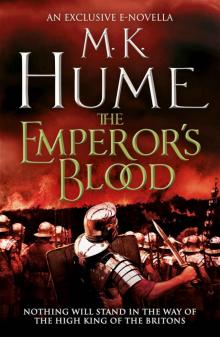 The Emperor's Blood (e-novella)
The Emperor's Blood (e-novella)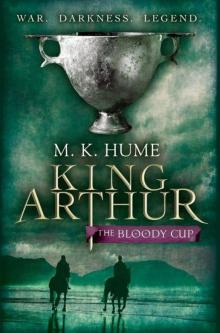 King Arthur: The Bloody Cup: Book Three
King Arthur: The Bloody Cup: Book Three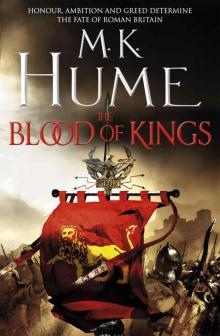 The Blood of Kings: Tintagel Book I
The Blood of Kings: Tintagel Book I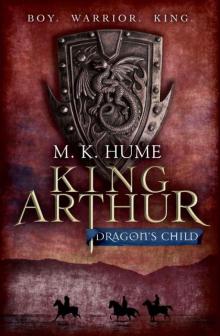 King Arthur: Dragon's Child: Book One (King Arthur Trilogy 1)
King Arthur: Dragon's Child: Book One (King Arthur Trilogy 1)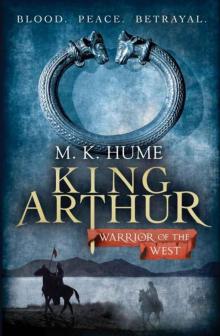 King Arthur: Warrior of the West: Book Two
King Arthur: Warrior of the West: Book Two The Storm Lord
The Storm Lord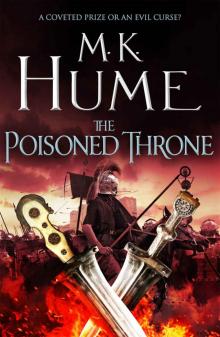 The Poisoned Throne: Tintagel Book II
The Poisoned Throne: Tintagel Book II![M. K. Hume [King Arthur Trilogy 04] The Last Dragon Read online](http://i1.bookreadfree.com/i2/04/07/m_k_hume_king_arthur_trilogy_04_the_last_dragon_preview.jpg) M. K. Hume [King Arthur Trilogy 04] The Last Dragon
M. K. Hume [King Arthur Trilogy 04] The Last Dragon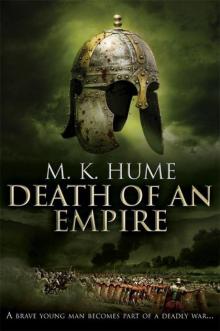 Prophecy: Death of an Empire: Book Two (Prophecy Trilogy)
Prophecy: Death of an Empire: Book Two (Prophecy Trilogy)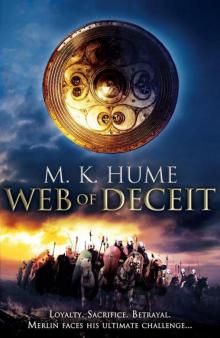 Prophecy: Web of Deceit (Prophecy 3)
Prophecy: Web of Deceit (Prophecy 3)